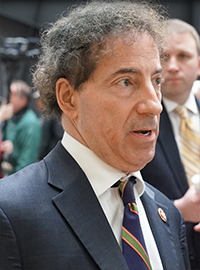| When A 'Difficult Conversation' Threatens Free Speech |
 |
|
By Byron York
Wednesday, April 03 2024 |
Democratic Rep. Jamie Raskin of Maryland is perhaps the leading Trump inquisitor in the House of Representatives. He led one impeachment, played a key role in another and helped produce the anti-Trump reality series that was the Jan. 6 committee. So when Raskin proposes to give a speech titled "Democracy, Autocracy, and the Threat to Reason in the 21st Century," you can probably guess what it is going to be about. That was the speech Raskin was scheduled to deliver recently at the University of Maryland. One might ask: What could go wrong bashing Trump on a college campus? Such a speech would be very, well received, wouldn't it? Only if the speaker were allowed to speak. In this case, Raskin got just a few sentences into his remarks before he was interrupted by pro-Palestinian protesters who yelled that Raskin was "complicit in genocide." In that moment, the Israel-Hamas war trumped Trump, and Raskin's prepared remarks went unspoken. (What follows is based on this account by Capital News Service.) Raskin did not ignore the protesters. He told them they would be better off engaging in conversation than "heckling." Then, according to Capital News Service, Raskin "emphasized that he has taken a strong position on returning the hostages held by Hamas, has advocated a military ceasefire, and has championed a two-state solution." Raskin then tried to resume his speech, which just led to more yelling from the protesters. At that point, Raskin said the protesters were "not engaging in real dialogue" and "not convincing anybody." Raskin surely knew that there would be no reasoning with the protesters. At some point, it appears there were pro-Israel voices in the crowd to answer the anti-Israel demonstrators. There was more heckling and yelling, and it soon became clear there was no way Raskin was going to continue his remarks. Then, according to Capital News Service, Raskin "abandoned his speech and said he was open to taking questions from the audience." That didn't work, either. Raskin's openness just led to "more discourse among protesters," which is a polite way of saying everybody kept yelling at Raskin and each other. Any hope of discussing "Democracy, Autocracy, and the Threat to Reason in the 21st Century" disappeared entirely. Indeed, the scene made the "threat to reason" part seem like a joke. Finally, the president of the University of Maryland, Darryll Pines, stepped in to stop Raskin's speech. All in all, it was another bad day for freedom of speech on college campuses, something the nation's institutions of higher education have seen a lot of in the last few years. The situation has become exponentially worse since the Hamas attack on Israel and Israel's ongoing retaliation. Here's the thing. University of Maryland officials should have been appalled that protesters stopped a member of Congress from speaking on campus. They should have vowed to take strong measures to punish those who shouted Raskin down and stop such demonstrations in the future. But they didn't. In fact, Pines seemed somewhat pleased by what happened to Raskin's speech. "He came here to speak about where our democracy is going in our country," Pines said of Raskin. "What you saw play out actually was democracy and free speech and academic freedom. From our perspective as a university, there are the difficult conversations that we should be having." Just in case it needs saying: Shouting down Raskin was not an exercise in free speech, and it was not an exercise in academic freedom. It was in fact the opposite of free speech and academic freedom. That a university president would say such a thing should be embarrassing to the university. Finally, it should be noted that Pines did say he wished the protesters had been more civil, according to the Capital News Service report. Pines also praised Raskin's "patience and empathy" when confronted by the protesters who prevented him from speaking. So Pines seemed to understand at some level that what took place was not a good thing. It is too bad he did not recognize the greater threat to free speech that happened in front of his eyes. Byron York is chief political correspondent for The Washington Examiner. COPYRIGHT 2024 BYRON YORK |
Related Articles : |
























